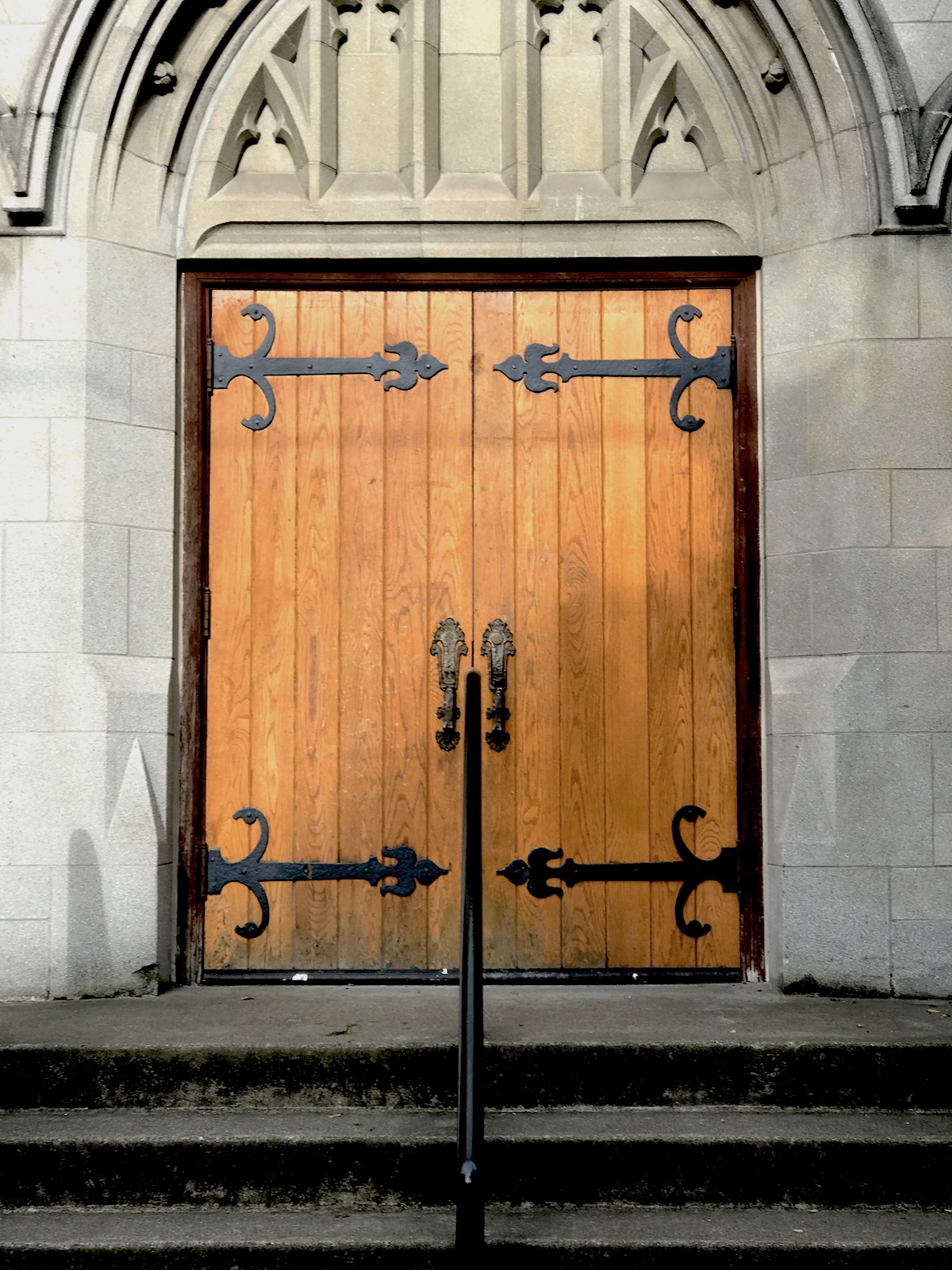Seattle Writing Prompts: The Church Doors
Seattle Writing Prompts are intended to spark ideas for your writing, based on locations and stories of Seattle. Write something inspired by a prompt? Send it to us! We're looking to publish writing sparked by prompts.
Also, how are we doing? Are writing prompts useful to you? Could we be doing better? Reach out if you have ideas or feedback. We'd love to hear.
We interrupt this writing prompts to call your attention to:
We're running a short story contest based on Seattle Writing Prompts, judged by Matt Ruff! Come and join the party, we can't wait to read your stories.

Portals are important. Transition spaces from one place to another: from outside, to inside; from a public space into a private space; from the room where you clean yourself to the one where you dress yourself. Every door, of course, is a transition, and we do love doors in our culture, don't we? We love big modern glass doors, and thick wooden plank doors. We love revolving doors and automatic sliding doors.
Let's say you work in a skyscraper downtown. First, you leave your home. If you live in a condo or apartment, you may pass through two or three doors to do this. Then you, perhaps, walk to the bus stop where you pass through the front doorway onto a bus, tapping your card or paying your fare. You leave the bus, maybe through the back doorway, and enter your office building, walk across the lobby, perhaps through the open doors into the coffee shop. You walk through the elevator doors on one level, and through others on your destination level. Then, finally, through the doors into the office. Anywhere from four to eight transitions every morning, but how often do we think about any of them?
Some cities are better for doors than others. For strange and mostly modern doors, San Francisco never fails to delight. For grand doors, some that take your breath away, London delivers. New York, of course, has millions of doors, and the ones that face the street from the tall buildings are all unique.
But no buildings quite do doors like churches. They are structures that take transitions seriously, because if you are a religious person, moving from the outside world to the inside world means moving from the profane into the sacred.
My father was a minister, and I can still remember the doors on the church I grew up in. Mid-century modern, almost. Very tall and broad, made of blond lacquered wood with small round glass insets and large, straight wooden handles, separated from the bulk of the door by round dowels. Something about building a church or cathedral calls for bespoke doors of great measure. Think about the history you're up against! The Florence Bapistry, say, or when you're already inside, Holy Doors (or Royal Doors). Why, just look at this random Pinterest page of church doors.
So, it seemed to me — someone who spends very little time in churches anymore — that thinking about the kinds of life events that happen when you cross these thresholds might make for some good writing prompts. They certainly encapsulate the whole lifespan of a person.
Today's prompts
They considered her a miracle. Premature by nearly a month, almost falling to a lung infection. They carried her, still less than five pounds, through the church doors where they would stand to have her baptized. Sometimes the ritual of showing up was important. Sometimes the ritual of being witnessed by a community was important. Sometimes you don't know if you will be able to make it through until tomorrow.
She was twelve. What she heard from the pulpit was a message against people like her. Against the secret she held, the self she hadn't confessed to any. And she wondered, what would happen when she was confirmed. Would there be some kind of retribution? Would that God they talk about strike her down as she stood there, in her white dress, asking to become part of a group who thought her bound for hell? Would she be struck down for walking through the doors into the church holding the thoughts she had?
She was thirty-five. The church doors were different, a new place. The hand she held walking through them, where lined up she saw all of their friends, and some of their family, cheering, belonged to her wife of all of ten minutes. A new beginning in a new place of acceptance.
She was thirty-eight. Now she carried the newborn, a plump and healthy ten-pound boy, through the doors. She thought of her own parents carrying her, and the stories they told of how they thought she might die but that she struggled, and she held her son closer with a promise that whatever was to come, they would face it openly and with love. What else could they offer him?
He was forty-four. She didn't want a service, really, but her friends refused to let her not have one. Services were for the living. So he carried her, parts of her in an urn, anyway. Back where there could be some stories shared and remembered, and where the last few painful years could be released. Tomorrow he'd fly home, after nearly four months by her side, caring for her. Now both of them were free, and that thought both weighed him down and freed him as he stepped across the portal into her church.